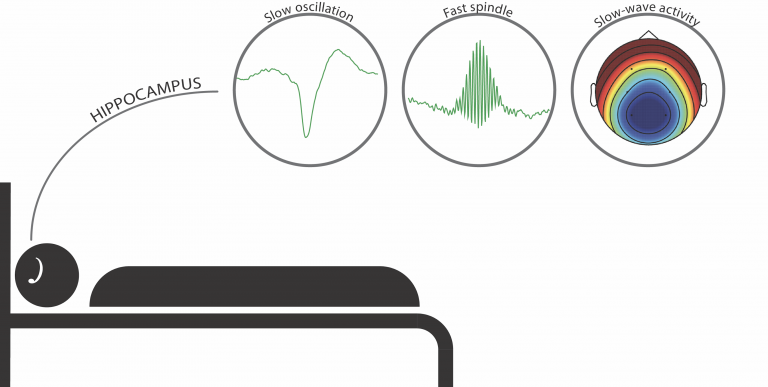Hippocampus damage disruptive for key sleep-related processes, finds new study
16 January 2020
A new study funded by Wellcome and conducted at the Wellcome Centre for Human Neuroimaging at UCL found that sleep-related brain activity is affected in people who have suffered damage to their hippocampi.

In a recent study reported in Current Biology led by Dr Goffredina Spanò in Professor Eleanor Maguire’s laboratory at the Wellcome Centre for Human Neuroimaging at UCL, researchers wondered what would happen to brain activity during sleep in patients with damage restricted to the two hippocampi and who consequently suffer from amnesia for their past experiences.
To test this, researchers recorded brain activity during sleep in the patients and matched healthy control participants over four nights.
The hippocampus is known to be important for processing long-term memories during sleep but its specific role is still not clear. Sleep is traditionally divided into different stages, each with defining patterns of brain activity.
Spanò et al. found that sleep quality and much of the brain activity associated with sleep was highly similar between the patient and control groups. However, one sleep stage, the deepest type of sleep known as slow wave sleep, was very significantly reduced in the patients. This is interesting because slow wave sleep is thought to be particularly relevant for consolidating long-term memories.
The researchers also found that there was mistimed coupling between two other aspects of sleep physiology that have been linked with memory processing – slow oscillations and fast spindles.
Overall, these findings provide evidence that the hippocampus seems to be necessary for the regulation of specifically slow wave sleep and the fine-tuning of other aspects of sleep-related brain activity. These results further implicate slow wave activity as key facilitator of memory processing, adding credence to efforts that target slow wave sleep in order to improve memory.
Professor Maguire said: “The study has implications not only for our understanding of how sleep works, but also the relationship between sleep and memory, and brings us a step closer to understanding why memory may be impaired in the range of conditions that compromise the hippocampus including dementia, epilepsy and limbic encephalitis.”
Links
- Dr Goffredina Spanò
- Professor Eleanor Maguire
- Wellcome Centre for Human Neuroimaging at UCL
- UCL Queen Square Institute of Neurology
- Article in Current Biology
 Close
Close

